|
|
|
Sort Order |
|
|
|
Items / Page
|
|
|
|
|
|
|
| Srl | Item |
| 1 |
ID:
113988


|
|
|
|
|
| Publication |
2012.
|
| Summary/Abstract |
De-legitimization of the State of Israel is the current episode in a persistent genocidal project aimed at the Jews and, more profoundly, at the values inherent in Judaism and shared by civilized societies. Skirting the shame attached to anti-Semitism after the horrors of the Holocaust, contemporary advocates of the genocidal plot are given free rein to attack Jews by a combination of severe criticism of the State of Israel and well-meaning plans for its geopolitical future, i.e. the peace process. Ugly lies - the Jews stole the land from the Palestinians, Israel is an apartheid state - function like the age-old charges that justified persecution of the Jews as Christ killers. Beautiful lies - the two state solution that everyone knows - echo the proto-legalistic measures that gradually deprived European Jews of their rights, their strength, their resources and capacity to resist deportation and extermination. Americans, misinterpreting as a repetition of the 1930s the rise of violent anti-Semitism in Europe at the dawn of the twenty-first century, are unprepared to deal with a parallel rise in Muslim Brotherhood forces within the US. As brutal Islamic Jew hatred boils in an Arab-Muslim world revolting, reforming, and submitting to sharia law, the Obama administration conducts a policy of the outstretched hand and blindfolded eyes that leaves Iran free to develop the ultimate genocidal weapon. Israel is the bulwark, not only for Jews but for the free world. Clear thinking, uncompromising discourse, and resolute action - at the risk of being labelled extremist - can stop the genocidal project and, working backward, disarm the lies.
|
|
|
|
|
|
|
|
|
|
|
|
|
|
|
|
| 2 |
ID:
140932
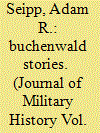

|
|
|
|
|
| Summary/Abstract |
This article examines a large body of written and oral testimonies by American servicemen who witnessed the liberation of the Buchenwald concentration camp in April 1945. During the decades since, the experience of liberation has become a central component of American public memory of World War II in Europe. As this article demonstrates, liberator testimony has shifted in important ways during the subsequent decades, both reflecting and shaping changes in American engagement with both the war and the Holocaust.
|
|
|
|
|
|
|
|
|
|
|
|
|
|
|
|
| 3 |
ID:
085176
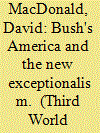

|
|
|
|
|
| Publication |
2008.
|
| Summary/Abstract |
This article examines how the USA's growing 'Holocaust consciousness' has impacted on conservative interpretations of the transatlantic rift. Presenting the Holocaust as an antipode to US national identity has helped signal a moral divergence between the USA and Europe. The instrumentalisation of the Holocaust and anti-Semitism has allowed US conservatives to reframe norms of self-defence, victimisation, and liberation in justifying the invasion and occupation of Iraq. In the wake of Iraq claiming anti-Semitism as a 'European disease', and anti-Americanism and anti-Semitism as 'twin brothers', helps delegitimate European criticism of the war on terror. A new form of exceptionalism portrays the USA not only as the liberator of death camps and the protector of the Jewish people but, after 11 September, as a victim itself.
|
|
|
|
|
|
|
|
|
|
|
|
|
|
|
|
| 4 |
ID:
121587


|
|
|
|
|
| Publication |
2012.
|
| Summary/Abstract |
The substantial literature on mass violence, from ethnic cleansing to civil wars, has paid surprisingly little attention to the largest instance of mass violence in human history: the Holocaust. When political scientists have approached the subject, the trend has been to treat the Holocaust as a single case, comparing it-sometimes controversially-with other instances of genocide such as Rwanda or Cambodia. But historically grounded work on the destruction of European Jewry can help illuminate the microfoundations of violent politics, unpack the relationship between a ubiquitous violence-inducing ideology (antisemitism) and highly variable murder, and recast old questions about the origins and evolution of the Holocaust itself. After reviewing new trends in history-writing, I highlight opportunities for social-scientifically oriented research centered on the interaction of state power, local communities, and violent mobilization in five areas: military occupation, repertoires of violence, alliance politics, genocidal policymaking, and resistance. My conclusion addresses thorny issues of comparison, morality, and memory.
|
|
|
|
|
|
|
|
|
|
|
|
|
|
|
|
| 5 |
ID:
116888
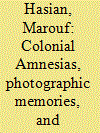

|
|
|
|
|
| Publication |
2012.
|
| Summary/Abstract |
This article provides readers with a biopolitical critique of the recent debates that have swirled around the renovations at the Royal Museum for Central Africa (rmca) and the 'Memory of Congo' exhibits. The author argues that the rmca has become a contested site of memory, where some older photographs that were once used in Congo Reform Movements have been reappropriated in (post)colonial disputes about the epistemic and demographic features of what Adam Hochschild has called the forgotten Congolese 'holocaust'.
|
|
|
|
|
|
|
|
|
|
|
|
|
|
|
|
| 6 |
ID:
144424
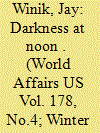

|
|
|
|
|
| Summary/Abstract |
What did the era’s most prominent symbol of humanitarianism think when confronted with the world’s most compelling moral outrage? History records only a question mark.
|
|
|
|
|
|
|
|
|
|
|
|
|
|
|
|
| 7 |
ID:
170709
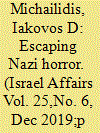

|
|
|
|
|
| Summary/Abstract |
This article deals with the case of Greek Christian refugees who fled to Cyprus and to the Middle East during WWII in an effort to point out how their settlement was related in a way to the simultaneous movement of the Jewish refugees, mainly survivors of the Holocaust, who tried to reach Mandatory Palestine. The exodus was part of a general movement from many occupied countries, mainly Greece, Poland and Yugoslavia, towards safer areas under the control of the Allies in the Middle East and Africa. It has been estimated that more than 73,000 refugees from these countries had been established in these areas in 1944. The Greek Christian refugees were placed in Nuseirat and Moses Wells camps, while Atlit remained mainly a camp for the Jewish refugees. The majority of Greek Christian refugees were repatriated by UNRRA in Greece after the liberation of the country, in 1945 and 1946.
|
|
|
|
|
|
|
|
|
|
|
|
|
|
|
|
| 8 |
ID:
178710
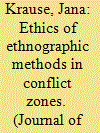

|
|
|
|
|
| Summary/Abstract |
This article examines the ethics of using ethnographic methods in contemporary conflict zones. Ethnographic research is an embodied research practice of immersion within a field site whereby researchers use ethnographic sensibility to study how people make sense of their world. Feminist, conflict and peacebuilding scholars who research vulnerable populations and local dynamics especially value ethnographic approaches for their emphasis on contextual understanding, human agency, egalitarian research relationships and researcher empathy. While immersion leads to knowledge that can hardly be replaced by using more formal approaches, it also elicits ethical dilemmas. These arise not only from the specific research context but also from who the researcher is and how they may navigate violent and often misogynous settings. I argue that many dilemmas may and perhaps should not be overcome by researcher skill and perseverance. Instead, ethical challenges may lead researchers to adopt limited and/or uneven immersion in their field site, not as failed or flawed ethnography but as an ethical research strategy that incorporates ethnographic sensibility to a varying extent. Examining why researchers may opt for limited and uneven immersion is important because in conflict research, stereotypes of the intrepid (male) researcher with a neutral gaze still tend to mute open discussions of how gender, race, ethnicity, nationality, class and other background factors inevitably shape immersion. This article seeks to contribute to creating discursive space for these conversations, which are vital for researchers to analyse, reflect and write from the position of a ‘vulnerable observer’ and incorporate greater transparency in the discussion of research findings.
|
|
|
|
|
|
|
|
|
|
|
|
|
|
|
|
| 9 |
ID:
067165
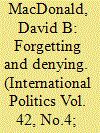

|
|
|
| 10 |
ID:
169563
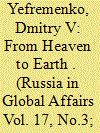

|
|
|
|
|
| Summary/Abstract |
The article explores the role of memory politics in building European identity. Memory politics is considered a functioning system of interactions and communication between different actors with regard to the political uses of the past. Memory politics is one of the key instruments for shaping the macro-political identity of a community. Supranational identity plays only a subsidiary role; at the supranational level, it is impossible to form a stable frame of collective memory. At the same time, European Union institutions are able to act as influential mnemonic actors to develop and implement various strategies of pro-European memory politics. Today, the strategy of recognizing the exceptional role of the Holocaust as a pan-European tragedy is subject to a fundamental revision in the EU.
|
|
|
|
|
|
|
|
|
|
|
|
|
|
|
|
| 11 |
ID:
161491
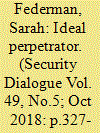

|
|
|
|
|
| Summary/Abstract |
Mass atrocity requires the participation of numerous individuals and groups, yet only a few find themselves held accountable. How are these few selected? This article offers a framework that is useful for understanding how the condemned often embody attributes that keep them in the spotlight. Because norms used to identify perpetrators can set the context for future violence, long-term security requires interrupting both the actions of perpetrators and the discourses about them. A form of praxis, this study of the contemporary conflict over the French National Railways’ (SNCF) amends-making for its World War II transport of deportees towards death camps considers how certain perpetrators come to stand for the many. The SNCF remains in the spotlight not because of greater culpability or an unwillingness to make amends but because it embodies attributes of an ‘ideal’ perpetrator: it is (1) strong, (2) abstractable, (3) representative of the nature of the crime, and (4) has a champion-opponent who focuses attention on the perpetrator. Understanding the labeling process makes visible who and what we ignore at our own peril.
|
|
|
|
|
|
|
|
|
|
|
|
|
|
|
|
| 12 |
ID:
086177
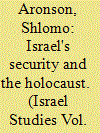

|
|
|
|
|
| Publication |
2009.
|
| Summary/Abstract |
The article analyzes David Ben-Gurion's lessons from the Holocaust and from Israel's War of Independence and deviations from his strategy. The lessons of the Holocaust were three-fold: First, that Israel, Zionism and Jews as well were a unique historical phenomenon, and therefore could expect to be alone and remain alone for decades to come. That Zionism, having lost its European backbone in the Holocaust, would have problems of legitimacy unless the Jewish state would accept the partition of Western Palestine and avoid ruling over a large number of Arabs, especially in the politically sensitive West Bank. Second, that every Israeli-initiated war will not be accepted by the Arabs as final, since they would recover and get ready for a new round, whereas Israel could not sustain one crucial defeat. Third, that the longer range solution to the total imbalance between Arabs and Jews in conventional terms, such as numbers, political and strategic clout, oil and vast territories, must be counterbalanced by invoking unconventional deterrence. The ensuing, even if limited to the elite, discussion of alternatives to this strategy was coined in terms of conventional preemption and acquisition of more territory, especially in the West Bank. The demise of Ben-Gurion's leadership in the early 1960s, and the emergence of security alternatives to his, in addition to role of the US in making the unconventional option illegitimate, would explain the road to the Six-Day War of 1967 and its ramifications until today.
|
|
|
|
|
|
|
|
|
|
|
|
|
|
|
|
| 13 |
ID:
141686


|
|
|
|
|
| Publication |
London, Cassell Ltd, 1979.
|
| Description |
243p.hbk
|
| Standard Number |
0304303992
|
|
|
|
|
|
|
|
|
|
|
|
Copies: C:1/I:0,R:0,Q:0
Circulation
| Accession# | Call# | Current Location | Status | Policy | Location |
| 020847 | 956.94/LAF 020847 | Main | On Shelf | General | |
|
|
|
|
| 14 |
ID:
190053
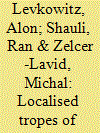

|
|
|
|
|
| Summary/Abstract |
This article focuses on the ways in which concepts and tropes of the Holocaust are used as political instruments in a part of the world that was not immediately affected by its events. It reviews the use of these concepts in selected cases from areas of political conflict in South Korea, Malaysia, and China and compares them with a view to finding a common denominator specific to these Asian countries. The article questions the futility of the current attempt to regulate definitions of antisemitism and its detachment from the realities of politics and academic and public discourse, especially in Asia. Finally, it demonstrates that the semantics of the Holocaust in the selected cases seldom signify anti-Jewish sentiment but are used for other rhetorical and political purposes.
|
|
|
|
|
|
|
|
|
|
|
|
|
|
|
|
| 15 |
ID:
088556
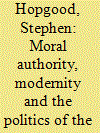

|
|
|
|
|
| Publication |
2009.
|
| Summary/Abstract |
Capitalist modernity's paradox is to erode explicitly the social capital it relies on implicitly to mobilize people to act in concert when they share neither an identity nor an interest. Monetization and rules are the exemplary mechanisms for realizing modernity's aim of commensurability between all social qualities. Simmel helps us see this. But these abstractions create an authority vacuum. The experience of Amnesty International, emblem of modernity, is an example of efforts to overcome this. A close analysis of Amnesty shows that its authority is derived not from Kantian universalism but from a representation of the sacred that serves as a non-modern foundation for modernity. Even as attempts are made to profane this moral authority through commodification and politicization, we can see in the universalization of the Holocaust narrative a renewed effort at creating a singular global memory for humanity as a whole.
|
|
|
|
|
|
|
|
|
|
|
|
|
|
|
|
| 16 |
ID:
090265
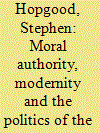

|
|
|
|
|
| Publication |
2009.
|
| Summary/Abstract |
Capitalist modernity's paradox is to erode explicitly the social capital it relies on implicitly to mobilize people to act in concert when they share neither an identity nor an interest. Monetization and rules are the exemplary mechanisms for realizing modernity's aim of commensurability between all social qualities. Simmel helps us see this. But these abstractions create an authority vacuum. The experience of Amnesty International, emblem of modernity, is an example of efforts to overcome this. A close analysis of Amnesty shows that its authority is derived not from Kantian universalism but from a representation of the sacred that serves as a non-modern foundation for modernity. Even as attempts are made to profane this moral authority through commodification and politicization, we can see in the universalization of the Holocaust narrative a renewed effort at creating a singular global memory for humanity as a whole.
|
|
|
|
|
|
|
|
|
|
|
|
|
|
|
|
| 17 |
ID:
076987
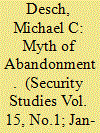

|
|
|
|
|
| Publication |
2006.
|
| Summary/Abstract |
The Holocaust has become an important part of the everyday discourse of American life. Indeed, it has become one of the central historical analogies for thinking about U.S. foreign policy in the post-Cold War world. The received wisdom about the Holocaust among most Americans is that the United States and the rest of the civilized world turned away Jews seeking to escape Nazi Germany before World War II, and then sat idly by while the Third Reich murdered nearly 6 million of them during the course of the war. In light of this reprehensible indifference, the United States shares some responsibility for the Holocaust, and it must "never again" allow large numbers of people to be slaughtered because of their race, ethnicity, or religion. Historical analogies are ubiquitous in foreign policy debates. Not only do they routinely shape state behavior, they usually do so for the worse. Hence, we should be wary of all historical analogies and examine them carefully to make sure they are based on sound history and used wisely by policymakers. The widely accepted Holocaust analogy illustrates, in my view, both how analogies are frequently based on a faulty reading of history and that policies based on them have not always served U.S. interests.
|
|
|
|
|
|
|
|
|
|
|
|
|
|
|
|
| 18 |
ID:
171050
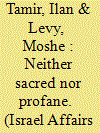

|
|
|
|
|
| Summary/Abstract |
The significant changes undergone by Israeli society notwithstanding, the Holocaust remains one of the foremost components of the collective memory, increasingly evoked in the public space including the media, popular music, and sports. Focusing on the infiltration of Holocaust discourse into the sphere of sports, as reflected in media coverage of sporting events, this article reveals a wide spectrum of Holocaust uses ranging from the derogatory to the laudatory – as means to inspire performance and extol achievements and unique sports moments.
|
|
|
|
|
|
|
|
|
|
|
|
|
|
|
|
| 19 |
ID:
186732
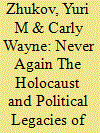

|
|
|
|
|
| Summary/Abstract |
Do individuals previously targeted by genocide become more supportive of other victimized groups? How are these political lessons internalized and passed down across generations? To answer these questions, the authors leverage original survey data collected among Holocaust survivors in the United States and their descendants, Jews with no immediate family connection to the Holocaust, and non-Jewish Americans. They find that historical victimization is associated with increased support for vulnerable out-groups, generating stable political attitudes that endure across generations. Holocaust survivors are most supportive of aiding refugees, followed by descendants, especially those who grew up discussing the Holocaust with their survivor relatives. An embedded experiment demonstrates the steadfastness of these attitudes: unlike non-Jews or Jews without survivor relatives, survivors’ and descendants’ views toward refugees do not change after reading an in-group versus out-group–protective interpretation of the “never again” imperative. Histories of victimization can play an ameliorative role in intergroup relations.
|
|
|
|
|
|
|
|
|
|
|
|
|
|
|
|
| 20 |
ID:
086178
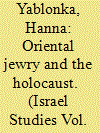

|
|
|
|
|
| Publication |
2009.
|
| Summary/Abstract |
This article deals with one of the most dominant elements in Israeli national identity-the Shoah. The paper asks how the Mizrahim in Israel related to it, since for most of them it was a remote historical chapter. The answer is given through an analysis of three generations of Mizrahim-those who lived during the Second World War and immigrated to Israel during its formative years; their children, most of whom were born in the Jewish State and educated in the Israeli educational system; and their grand children. The first generation viewed the destruction of the European Jews with profound compassion, but felt that the Shoah was a chapter in the history of the European Jews. Their children attempted to connect, facing, to a large extent, resentment and alienation. Their grand-children already have the Shoah burnt in their souls-being an integral part of their self-definition as Israelis.
|
|
|
|
|
|
|
|
|
|
|
|
|
|
|
|
|
|
|
|
|